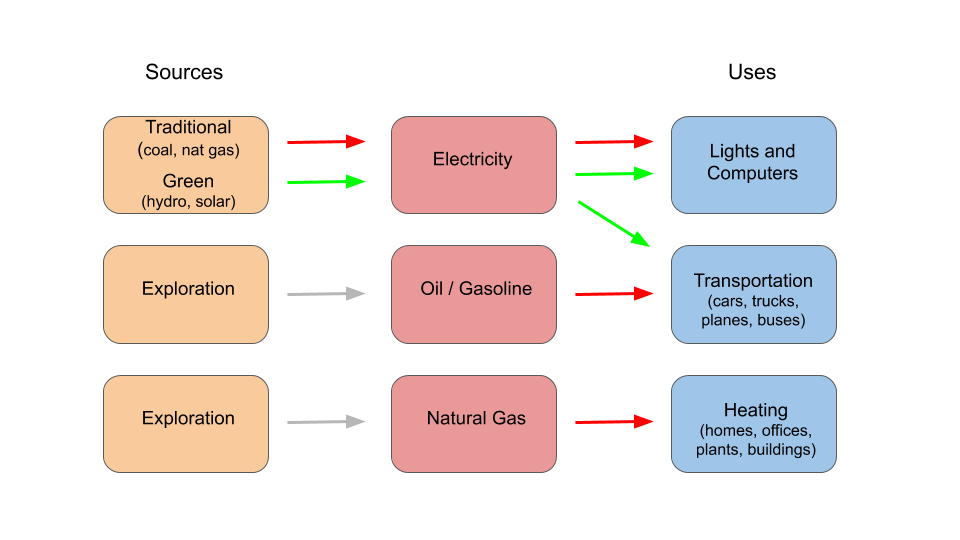The problem with economics is people have difficulty seeing the point where theory ends and practicality begins, so nobody understands it. That’s why countless arguments revolve around theories that really don’t fit. Such is the case with carbon tax.
Now to get anything from this article you must accept that climate change is real. That, for the purpose of this discussion, there’s no doubt the dangers claimed by earth scientists are 100% accurate and not politically motivated. Once done, swallow, and focus on your nation’s role in addressing this crisis.
Sources and uses
We have many types of energy, used in different ways, that come from multiple sources. To simplify things, let’s start with a chart:

Follow the green arrows and you’ll see the solution is to generate clean electricity, and then use it for everything. That’s what’s happening in transportation. Electric cars are surely coming and we now have electric buses. Back in the 80s, my aunt’s home used electric heat and all modern appliances are energy efficient. So we’re getting there on the consumption side. What we don’t know is how to make power that’s completely green.
Green
You’ve heard it before that hydro is clean. So if the world had waterfalls and dams everywhere we wouldn’t be talking. Unfortunately, not every region has a Niagara Falls. That’s why fossil fuels are still being used. And since nuclear seems to be off the table, we‘re stuck with natural movements like wind and, of course, solar.
But Canada has done little in either regard. Windy places like Newfoundland only have a few mills and sunny Alberta has hardly a panel. Clean abundant provinces like Ontario, BC, and Quebec—that generate over 90% of their electricity from green—have spent more on both than anyone. So to me, it seems like we’re unorganized. Enter carbon tax.
Carbon tax
Carbon tax is aimed at reducing direct consumption. The theory goes if you’re forced to pay an additional 10-30 cents per litre for gasoline, you’ll drive less or switch to a smaller car. Then maybe you’ll go electric when your type of vehicle becomes available.
Well, I don’t see anyone driving less. And currently electric vehicles are all small. So trading my fuel efficient Corolla for one of these doesn’t make sense. We’ve seen high gas prices before. Likewise with home heating. Granted my aunt had electric, but today there isn’t an alternative to gas—so you can only move to a smaller house. But when you factor in discomfort and the real estate fees, you’ll probably stay put.
They also say when faced with higher energy charges business will innovate—so they save money. Nice pipe dream. Most large businesses in Canada operate within a co-opoly. So for them, as costs go up, prices do too. It’s not like Bell will invent a waterfall to get a leg up on Telus. That’s not the way it works.
Long story short: carbon tax in Canada is mostly a tax. It may work when electric cars are fully available and home heating comes in alternatives, but right now it’s mostly a tax. And dwelling on direct consumption isn’t really solving the problem. We need more technology.
Challenge
Over two billion people are entering the middle class with another two billion coming. So in a world of that many, our country’s role isn’t to show everyone how to consume. It’s to help develop green. Specifically, generating electricity from non-carbon sources.
We need a project of a NASA-like nature, to focus on earth. Specialty centres where scientists can create without budgets or bottom lines—and economics doesn’t do that.
Instead of acting like some kid looking for a participation award, Canada should be leading the charge by hosting its own NASA centre. Hey, the world needs more carbon-free power and who’s going to do it? The Africans?
The plan
During WWII, Winston Churchill and FDR talked to the masses. They used radio for countrywide meetings to explain things and rally the troops. This held everyone focused because people knew what the plan was. And it made sense because this was a crisis.
So who’s in charge of solving climate change? Business, billionaires, or government? If government, which ones? Canada, the EU, or China? Truth is, we’ve inspired hundreds of tiny spikes traveling in all sorts of directions without any mission control. And though this approach can be very creative, it doesn’t work with a crisis.
We can build batteries for buses but can’t make one for the Ford F-150. Tesla can electrify larger vehicles but doesn’t know how to make cars. GM knows how to make cars, but when it comes to electric vehicles they can only build smaller ones. So, while earnest and worthwhile, efforts haven’t been coordinated. When faced with an epidemic, the World Health Organization doesn’t operate in millions of cells. The body takes charge. And when faced with natural disasters, every country has a system. But when it comes to climate change we have only one organization to detail the problem. Nothing to find the cure. That’s not good.
Summary
A popular line used by crusaders is “what are you going to tell your grandchildren?” As if it’s all the consumer’s fault. Here’s what I’ll be telling mine. We spent an awful lot of time staring at the wrong end of the dog.
Politics and mankind require strong leaders to operate and we didn’t have a Churchill or FDR. We had only naive do-gooders unqualified for their job. Not bad people, just ones who shouldn’t have been in charge. Then again, maybe there is no solution to this grave situation. Maybe it’s just not possible to make enough energy that is green? Maybe the species who developed the Hubble telescope and landed on the moon isn’t capable of this task? And maybe inventions like the computer and nuclear power were all just flukes.
Hey, wait a minute.